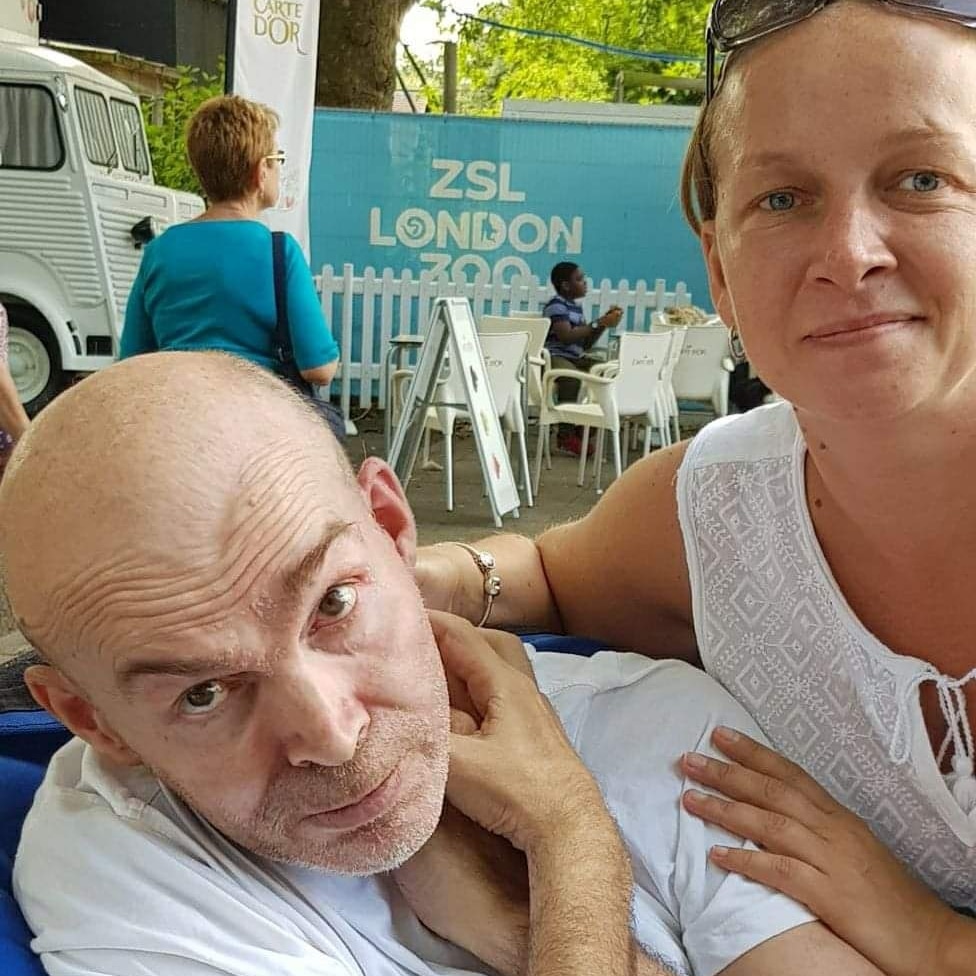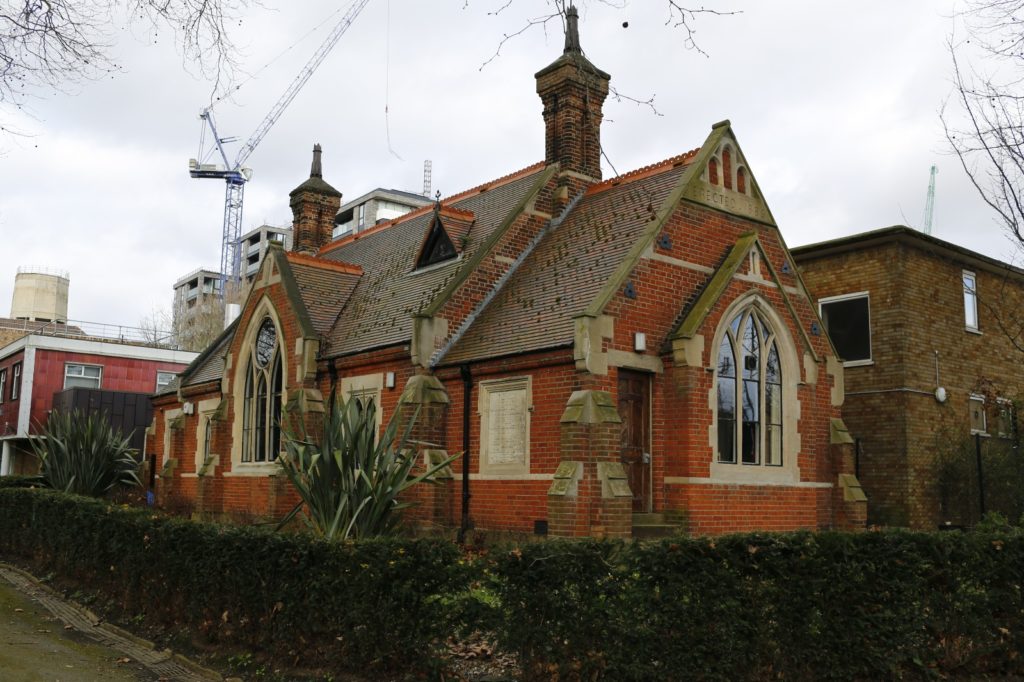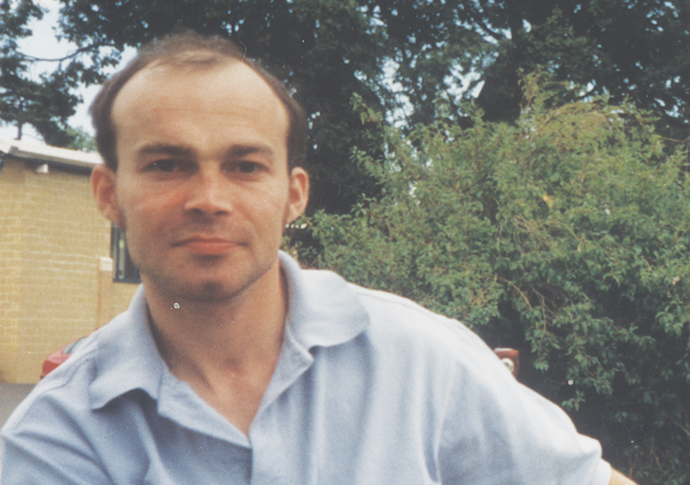Detectives investigate how man with brain damage died ‘choking on his food’
Family in second search for answers after death of man dependant on carers
Monday, 19th August 2024 — By Richard Osley

Ryan St George was left needing around the clock care after being failed by the prison authorities
DETECTIVES are investigating reports that a vulnerable man dependant on carers died after choking on food.
Police confirmed they are reviewing the case of Ryan St George, who was so badly brain damaged that he was unable to look after himself and could not prepare his own meals or eat unaided.
The 53-year-old was left in this condition after a scandal at Brixton Prison in 1997 which saw failures to get quick medical attention to him after he fell from the top bunk bed in his cell.
Mr St George had been serving a short term for stealing batteries, but the decision to send him to jail was often described by his late father David as a death sentence.
Decades later, and after winning compensation from the prison service, he was living in a flat in Holmes Road, Kentish Town when he died in July 2022.
Paramedics said in a report following his death they had to remove a “grey mass of soft food tucked to [the] right side of [his] oesophagus” before they could start resuscitation. This has not been marked on his death certificate.
Mr St George had been struggling with laboured breathing through the night and not drinking properly that evening.
He had largely been looked after by his aunt Margaret, who devoted her life to caring for him. But at the time of his death, she was in hospital after a fall of her own and he was being looked after by a carer from United Health (UK) – as commissioned by the North Central London Integrated Care Board.

Ryan St George with his sister Louisa
She was left devastated to find out he had died during her short absence.
“I want to ask how my nephew, who I loved and looked after 24/7 for 25 years, suddenly died unexpectedly on July 11,” she said earlier this year. “We have not had any answers. Ryan had the right to life. He had no problem eating if he was given small pieces and time before the next mouthful. It didn’t take a [doctor] to care for him – just love.”
The New Journal visited Mr St George several times during the family’s legal battle over the lack of medical attention he received at Brixton Prison. He retained a strong grip but was unable to control his movement, and while he would look at visitors as if he may recognise them nobody really could say what he understood.
Experts had always been amazed that he had survived at all and was living with one of the worst cases of brain damage in the UK.
Mr St George’s sister, Louisa, said: “It is so hard to accept because my father had already fought so hard for justice for Ryan over many years. He was still with us when Ryan died and he must have been so angry that after all that – to get the care Ryan needed – his son died choking.”
She added: “If he had passed away peacefully from pneumonia, then the family would be sad – but we’d accept it. But this leaves so many questions as to what happened – and it’s been more than two years now.”
Despite the unanswered questions and possible lessons to be learned from the case, there was no coroner’s inquest into Mr St George’s death ordered.
Camden Council reviewed the circumstances and this triggered a safe-guarding review. The scope of this is limited to understanding good practice, and not establishing if anybody was to blame.
More options would potentially be open to the police if they decide further action is needed.
A Met spokesperson confirmed: “Detectives are carrying out enquiries relating to the death of a man in Camden in 2022. “An investigation is ongoing and officers have been liaising with the family of the victim. They will be kept updated as the investigation progresses.”
United Health did not answer the questions we sent to them this week and advised the New Journal to put them to the council. Camden, however, said it did not provide comment on behalf of United Health.
A Camden Council spokesperson said: “These are very sad circumstances, and our deepest sympathies remain with the family and friends of Ryan St George. “We carried out our own safeguarding investigation at the time and updated Ryan’s family. This also triggered the council to make a referral to the borough’s Safeguarding Adults Partnership Board for a Safeguarding Adult Review to take place.
“Camden’s Safeguarding Adults Partnership Board are continuing their review into Ryan’s death and we are continuing to provide information and assistance to the independent chair of the review where required.”
Christabel Shawcross, the independent chair, said: “We understand that the time it takes to complete such a review can be frustrating for families and friends, but the priority in such cases is to ensure it is conducted thoroughly, with full participation from all involved which can take time. As soon as this Review is completed, we will update the family and review the learnings with all involved partners.”
A spokesperson for the North Central London Integrated Care Board said: “We would like to offer our deepest condolences to the family of Ryan St George.
“We are contributing fully to an ongoing Safeguarding Adults Review into the care that Ryan received and are unable to comment further until that has completed.”
Care company’s three line response to the CNJ
A CARER from United Health UK was reportedly looking after Ryan St George on the night he died in July 2022.
As always, the New Journal offered full space for the company to comment on the case this week.
The only response was a three line email which said: ‘Please, be advised to refer your enquiry to Camden’s Press Office’.
Camden’s press office has confirmed that it does not publish statements on the company’s behalf.
Why was there no coroner’s inquest?
MAYBE it’s a good thing that a lot of people do not know what a coroner’s inquest is – because if you are sat inside the courtroom on the edge of St Pancras Gardens it probably means you have lost a loved one in distressing circumstances.
Inquests are not trials but they are fact-finding missions which seek to establish the circumstances around somebody’s death.

St Pancras Coroner’s Court
Coroners can insist on people involved coming to the court to answer questions and can file recommendations on preventing similar incidents.
The New Journal has covered hundreds of them over the last four decades – including cases in which people have choked on food.
Relatives have said they are surprised that one was not arranged in the case of Ryan St George – given the nature of his death and the questions they have over his care on the day he died.
There is no easy way for the press to ask questions directly of the coroner at St Pancras.
The New Journal did try to get an explanation as to why one was not needed in this case. Coroner Mary Hassell’s team said they would respond but had not provided one by the time we went to press – and still has not received a response.
Unsung hero who gave up her life to care for nephew
IF Ryan St George was able to recognise anybody, it would have been his doting aunt Margaret – who pledged from the moment his life changed forever in that Brixton prison cell that she wouldn’t leave his side.
In fact, Ms St George was specifically praised for her “selfless devotion” by the judge which ruled that the prison authorities had failed him and that compensation was due to pay for his care.
Now 92, she was left heartbroken when she was forced to be apart from him after a fall of her own – and to learn in hospital that he had passed away.
“I just keep thinking if I hadn’t have had to go into hospital, then Ryan would still be here,” she said. “It’s a horrible feeling. I just want to have been there when he was choking. I knew how to care for him, and what he needed. I loved him, and I said to him that I wouldn’t leave him.”
Ms St George was one of the unsung heroes of the borough who look after a loved one with complex needs for years.
It was only after the long-drawn out compensation case was finally resolved in Mr St George’s favour that they were able to move out of a council flat packed with hoists and a wheelchair to the flat in Holmes Road which was better suited to caring for him.
In the past, she would be seen pushing his large motorised wheelchair down Kentish Town Road – an inseparable double act.
“Ryan was a nice boy,” she said. “He didn’t do anything wrong, and I feel so sad. We must find out what happened that night.”
A long, long road to justice
ONE of the saddest elements of the quest to find out what happened on the night Ryan St George died is that his family had already spent years fighting for justice in his name.
While the two cases are not directly related, Mr St George would have been able to feed himself if it had not been for the shameful events that unfolded at Brixton Prison in November 1997.
Then 29, he was serving a short term for theft – it has been a point of contention as to whether he should have been given a custodial sentence in the first place – when he suffered an epileptic seizure and tumbled from the top bunk bed to the hard stone floor.

Ryan St George before the scandal at Brixton Prison
His head was split open and his brain was being deprived of oxygen, but wardens were later described as having an “arrogant and unacceptable attitude” as they failed to clear his airways.
Fellow inmates proved to be more helpful than the prison staff, a judge later declared, and there were delays in calling for more help and geting an ambulance through the gates.
The journey to hospital took more than half an hour with paramedics shocked by the delays.
Medical staff felt he had no chance of surviving and a priest was called to deliver the Last Rites.
Somehow, however, he did survive, albeit destined for a life of being unable to look after himself or communicate properly with others. Rather than hold their hands up to the catalogue of errors which led to the delays to his care, Mr St George’s father David had to fight the claim for damages through the courts against spurious defence arguments for years.
Sitting in court with binders full of paperwork and reports, he refused to give in.
Lawyers from the Camden firm Hodge, Jones and Allen had to track down witnesses themselves, and built a case which exposed the pathetic attempts by prison staff to help Ryan St George.
In 2010, there was finally justice for his son when an award of £4.7 million – a record sum – was made against the Home Office in the High Court.
The money was paid in installments to help cover Mr St George’s care and to buy a more suitable flat for his needs. It was a David versus Goliath court victory which was meant to make sure Ryan St George would be well looked after for the rest of his life. David St George had been no stranger to courtrooms.
While he was well known in several Kentish Town pubs and a joker amongst friends in the local bookmakers, his day job was deadly serious and he worked as the longest-serving news correspondent at the Old Bailey.
There he had seen life’s miseries play out, perhaps accounting for his stoic response whenever asked about how he coped with the tragedy.
“Ryan was effectively killed by staff incompetence and a couldn’t-care-less attitude,” he said – of the incident at the prison. “Nobody has ever actually apologised.”
David St George himself died aged 82 last year, with his passing following the death of his wife and his son in the years before.
But he had set a precedent for demanding that questions around Ryan St George’s care, which his family are following today in relation to the night he died.